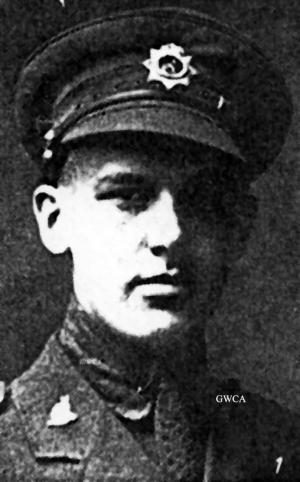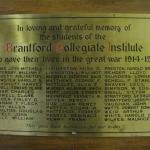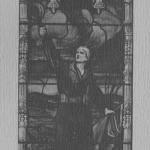Cause of Death: Pneumonia
Location: Toronto, Ontario
BX February 7, 1916
Lieutenant John Egerton Vaughan Died in Toronto
The countless friends of Egerton (Ted) Vaughan of this city will regret to learn of his death at Toronto this morning. Ted, as he was popularly known attended the B.C.I., where he was a cadet captain for some years. He applied for a commission with the 125th Battalion, but was thought too young. On the recommendation of Brigadier General Logie, however, he was taken on with the 116th (Uxbridge) Battalion as a lieutenant. He was taken ill at Uxbridge a little over two weeks ago, and was sent to the Toronto General Hospital, suffering from pneumonia. Dr. Pearson of this city was in attendance on him yesterday, but the young man passed away early this morning. He will be laid to rest in Mount Pleasant cemetery, Toronto, beside his father, the late Chief of Police Vaughan of this city. His bereaved mother will have the sympathy of many friends throughout the city.
BX February 8, 1916
Full Military Honors Tendered – Remains of Late Lieutenant John Egerton Vaughan Impressively Laid at Rest
Toronto, Feb. 8 – A full military funeral was accorded the late Lieutenant John Egerton Vaughan, youngest officer of the 116th Battalion, who succumbed to an attack of pneumonia at the General hospital on Sunday evening. A private funeral service for relatives was held at the home of his uncle, Mr. R.C. Vaughan, 66 Dunvegan Road, at 2 o’clock this afternoon, followed by a military funeral service, at the conclusion of the private service, in the Timothy Eaton Memorial church. The gun carriage which conveyed the body was supplied by the 9th Battery.
At 3 o’clock a public and military funeral service was conducted at the Eaton Memorial church by Rev. Captain Alfred Edward Lavell, chaplain of the 125th Battalion, and pastor of the Brant Avenue Methodist church, Brantford, assisted by Rev. Dr. Henderson, pastor of the Eaton Memorial church.
Many military and other representatives from Brantford and Uxbridge were present at the service to pay their last respects to the young officer, who always bright and cheerful was a great favorite with the officers and men of the battalion which was stationed at Uxbridge. His popularity was evidenced by the large number of floral tributes which were received. Among the tributes were one from the officers of the 116th Battalion and one from the officials of the Brant Avenue Methodist church of Brantford with which the deceased was connected.
Among those present at the service in the church were: Sir John Eaton, Brigadier General Logie, Chief Constable Slemin of the Brantford police, members of the general staff from the Exhibition Camp, and a great number of officers and men representing the company of the 116th Battalion which the late lieutenant commanded, and which is in camp at Uxbridge.
After a very impressive service at the Eaton church, the funeral procession, headed by the battalion band, and accompanied by the firing party, proceeded to Mt. Pleasant cemetery, where the usual military procedure of paying the last respects to the deceased officer were given.
BX February 9, 1916
Were Pall Bearers
Lieutenants Duff and Cliff Slemin were pall-bearers at the funeral of the late Lieutenant Egerton Vaughan in Toronto yesterday. Captain the reverend A.E. Lavell was the officiating clergyman.
BX September 27, 1920
Memorial Window to Heroic Fallen Unveiled at Brant Avenue Church – Chancellor Bowles of Victoria College Officiated at Official Recognition of Nine Members of the Church Who Gave Their Lives in the Great War – A Ceremony Pregnant With Meaning
In dedication to the nine men of Brant Avenue Methodist Church who gave their lives in the Great War, a memorial window was unveiled in that church at the morning services yesterday. Rev. Chancellor Bowles of Victoria College, Toronto, gave the message of consolation to the friends of the soldiers whose memory he extolled and Major A.E. Lavelle, D.D., and Major E. Sweet both in uniform, unveiled the window. The congregation filled the church to the last pew and each one could not fail to receive, from the simple and impressive ceremony, a strong, new motive for keeping alive what Chancellor Bowles called a great and glorious memory.”
Deeply impressive and heart soothing was the whole ceremony. Rev. J.D. Fitzpatrick, the pastor of the church, was in charge and the choir gave special music, including solos by Miss Reba Force and Miss Margaret Stephen, the latter of Toronto. The military significance of the event was emphasized by the number of men attending in uniform. Besides Major Sweet and Major Lavell, places of prominence were given to Col. M.A. Colquhoun, D.S.O., C.M.G., Lieut.-Col. M.E.B. Cutcliffe, Major Jordan, Lieut. K.V. Bunnell, Lieut. Donald Waterous, Lieut. Charles Sheppard, Capt. (Dr.) Leonard Coates, Capt. Dufferin Slemin, Lieut. Fred Pinnell, Capt. Morley Verity and Sergt. James Hitchon, Nursing Sister, Captain Annie Hartley, was also present.
The Decorations
A special committee had spent much time in making the church beautiful, draping the chancel in flags and wreathing maple leaves over the window and around the memorial tablets formerly erected. Bouquets of mauve and white and pink and white asters were placed on the sill of the window.
The Sermon
Following the solemn prayer by Rev. J.D. Fitzpatrick and the choir offerings, Rev. Chancellor Bowles preached a most impressive sermon.
The dedication of the memorial, said Dr. Bowles, was promoted by instincts of love and gratitude and loyalty that sought to keep in recollection the names of those who were gone, their voices, their faces and the deeds they had done. Thoughts of them were like a benediction after prayer, for memories such as theirs soothed and elevated and enriched men’s lives and kept them in touch with the living past. Many memorials were being erected, he said, from simple tablets to costly community halls, churches and arches; yet the outward form mattered little, what counted was the appreciation and admiration of those who raised them. Every memorial was erected “Lest we forget.”
It was not likely this generation would ever see such another war, it was the grimmest and most awful thing men had ever faced; they had been overwhelmed by its terrible destruction and death. This ceremony was held to lead others to know its meanings and learn its lesson well – “Lest we forget.” Drawing his bearers to think of the many elements that entered into the cause of the war, the struggle, said the Chancellor, had written its own inner meaning. Humanity could live in safety on this earth only as a spiritual and moral force; there must be a right relationship among the nations; men had come to feel the sense of the ultimate value of what was right and what was fair. “We know what conceptions and ideals moved our boys,” Dr. Bowles went on. “They had the sense of human value. Most of them were scarcely young men, they were only boys. Life had no problems for them yet; the iron had not entered into their souls. Now they make one small portion of those who like in Flanders’ Fields. They had not lived their lives as some listening to me have almost done, they poured out the wine of youth, life’s passions; nor” he said, “will you cease to think of them as young and fair. From the many letters I read written by Victoria College students, I was struck by the cheer and the steadfastness to duty they expressed. From one I have here, written to the soldier’s mother, before the great struggle of August 8, he concluded, ‘a great triumph will take place and I shall have a part in it.’ Remember”, said the Chancellor in closing “that was the spirit that actuated them through it all.”
The Unveiling
Major Lavell and Major Sweet conducted the unveiling ceremonies, the former giving a brief address and the latter reading the names and drawing aside the Union Jack which covered the memorial window.
In beginning his remarks Major Lavell referred to Major T. Harry Jones, who had so much to do with the memorial window, but who had not lived to see the completion of the work. He said that out of the many thoughts that crowded in upon his mind there were but three he had time to express. The first was the sorrow that those present must feel who were nearest and dearest to the men whose names were on the memorial. This sorrow and perplexity at death was as old as the race. To this sorrow he had little to give but sympathy. Possibly if they would find the secret of Calvary and see our Lord’s death as victory and not defeat, they would have light and much comfort. The second was that the front line areas made a school the like of which existed nowhere else. It tested, disciplined and changed every man. They learned to know real values, what was worth retaining and what might be well given up. The third was that these brave young men having passed through this school that most of those present had not passed through, and therefore knew not, willingly faced death and died doing their duty, which to them was far preferable to mere living. Could their loved ones here not have faith in their faith and even in their sorrow and ignorance believe in the light seen by those who had fearlessly walked through the valley of the shadow?
Major Lavell quoted from Sir Arthur Currie’s message to the Canadian soldiers, delivered on March 27, 1918. How true, he said, his finals words had become and how appropriately they had been chosen for the inscription on the window: “You will not die, but will step into immortality.”
Impressively and clearly Major Sweet read the roll of those whose names were inscribed on the tablet:
Harold Staples Brewster
Alexander Finletter Brown
Hugh Dalton Livingston
Lawrence Wilmot Livingston
Joseph Howard Pinnell
Earl Pettit Pitcher
Harold Brant Preston
Frederick Stanley Schell
Egerton Vaughan
As the window was revealed and the names were called, the notes of the “Last Post” were sounded by Sergeant Beech of the Dufferin Rifles.
The committee of arrangements consisted of Mrs. R.S. Schell, Mrs. W.C. Livingston, Mrs. J.J. Vaughan, Messrs. W.S. Brewster, T.H. Preston, E. Sweet and C.S. Slemin.



